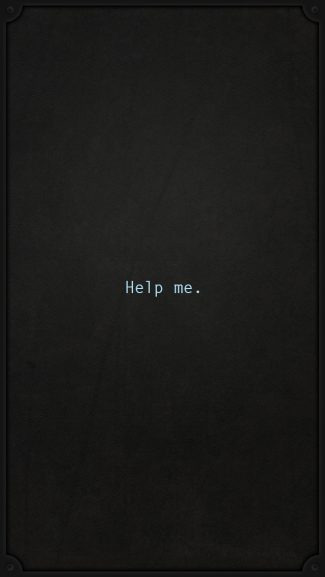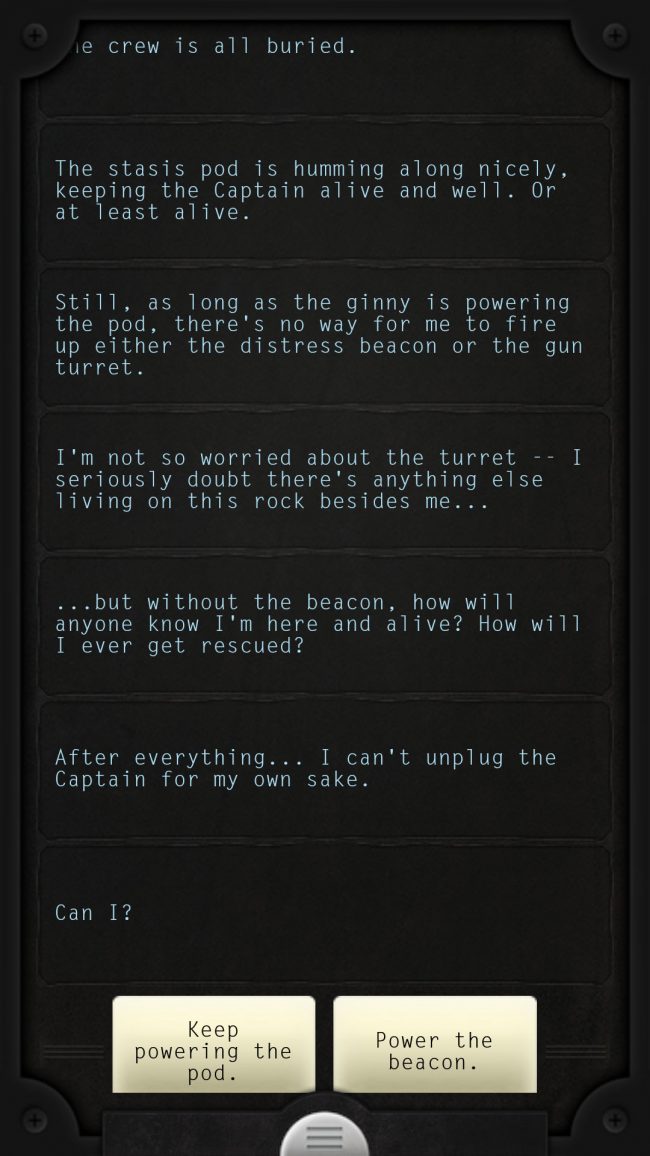Bastion
LQ: 9.15
Recommended Age: 10+
Skills Used: Planning, Working Memory, Mathematics, Reading
Lifeline is a text-based sci-fi thriller game reminiscent of a choose-your-own-adventure book. Players must talk an inexperienced space cadet and student researcher of unspecified gender, Taylor, through surviving the crucial three days following a ship crash on a moon in the Tau Ceti system. As Taylor searches for clues about the ship crash, a bigger and creepier mystery is uncovered. Though the events of the game are experienced through text communications with Taylor, the story is vivid, gripping, and sometimes downright scary. Additionally, though the game is rated E for everyone, Lifeline does contain a few instances of mild language and graphic descriptions. We recommend Lifeline for kids 12 and older.
 THIS GAME IS GOOD FOR KIDS WHO NEED HELP WITH:
THIS GAME IS GOOD FOR KIDS WHO NEED HELP WITH:Adapting and adjusting to changing conditions and expectations.
Most of today's kids aren't used to a text-based game like Lifeline, so the flexibility practice begins at the start screen. Though there's a lot to read through in the game, player input is minimal -- a series of either/or choices. It can be difficult to have so little control. To top it off, pointing Taylor in the wrong direction can get the inexperienced young cadet killed. So while seeing what will happen can be interesting and fun, players need to be ready to rewind the story if something goes wrong. Players will also experience flexibility vicariously through Taylor, who encounters a lot of unexpected obstacles and mishaps while exploring this strange moon and must tackle or work around them in order to survive.
Developing a systematic approach for setting and achieving goals.
Cadet Taylor learns that it's impossible to plan for certain situations. While it's unlikely your child will never know what it's like to try to survive on a desolate moon in a distant star system, they can take a page from Taylor’s book when it comes to assessing situations and thinking about the future. Because players are privy to nearly every angle of the decision-making process, they see Taylor’s problem-solving skills first hand. Taylor takes things step-by-step and thinks about something thoroughly before doing it, even when things seem thoroughly out of control.
Understanding our own actions, thoughts and feelings and empathizing with others.
 There are many opportunities to practice self-awareness while playing Lifeline. Through Taylor's words, players experience not only the danger and mystery of Tau Ceti but how the cadet feels about it all. When something doesn't go quite right or requires more thought, Taylor demonstrates reflection skills, and the candid expressions of fear, confusion, frustration, boredom, and joy give kids a great model for talking about situations and feelings and reflecting on choices and behavior.
There are many opportunities to practice self-awareness while playing Lifeline. Through Taylor's words, players experience not only the danger and mystery of Tau Ceti but how the cadet feels about it all. When something doesn't go quite right or requires more thought, Taylor demonstrates reflection skills, and the candid expressions of fear, confusion, frustration, boredom, and joy give kids a great model for talking about situations and feelings and reflecting on choices and behavior.
Being efficient and aware of our use of time and effort.
For Taylor, time is of the essence and impacts nearly every decision. Nights on the moon are inhospitable, so journeys, explorations, and preparations must be wrapped up in time to make camp by the time Tau Ceti sets. Taylor often remarks on the fact that there isn't time to do everything, so choosing tasks and trips wisely is vital. This model of prioritizing and efficiency is excellent for kids who struggle with time management. In addition, the game (when not in fast mode, which is unlocked when players rewind the story) is designed to be played in short bursts. Taylor is often busy for minutes, even hours, leaving players notifications when it's time to talk through another situation or decision. Yet there is no rush to reply; just as the game is put on hold while Taylor works on a task, Taylor's world pauses while players go about their day. It's up to the player to choose what they'll focus on -- the game, or a real world task that needs doing.
All membership plans come with full access to our entire suite of tools learning guides, and resources. Here are a few of the ones we think you’ll like the most: